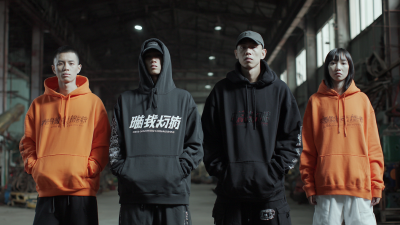
In recent years, the global athleisure market, valued at approximately $300 billion in 2020, has witnessed a noticeable surge in the popularity of men's tracksuits, with a projected growth rate of 7-8% annually (Statista). This rising trend has prompted global buyers to seek high-quality tracksuits that not only meet fashion standards but also adhere to sustainability and performance criteria. However, sourcing these garments presents numerous challenges, including ensuring fabric quality, managing supply chain complexities, and navigating different regional regulations. The importance of a well-structured sourcing process cannot be overstated, especially as men's tracksuits become synonymous with both comfort and style, appealing to a diverse range of consumers worldwide. Consequently, understanding the ins and outs of sourcing quality men's tracksuits has become imperative for global buyers aiming to stay competitive in this ever-evolving market.

When sourcing quality men's tracksuits for a global market, it's essential to navigate the diverse quality standards that vary significantly across regions. For instance, European buyers often prioritize materials that offer breathability and moisture-wicking properties, aiming for tracksuits that enhance athletic performance while also providing comfort during everyday wear. On the other hand, U.S. consumers might focus more on style and fit, with a growing trend toward athleisure that blends functionality with fashion. This divergence in priorities can complicate the sourcing process for manufacturers and suppliers who must tailor their products to meet these distinct preferences.

Additionally, the sustainability movement is impacting quality standards across the globe. Buyers are increasingly demanding tracksuits made from eco-friendly materials and responsible manufacturing processes. This trend presents both opportunities and challenges for sourcing professionals. On one hand, adhering to these higher standards can attract environmentally-conscious consumers; on the other, it may require more investment in sourcing ethically produced materials. Establishing clear communication and understanding cultural nuances in quality expectations is crucial for successfully navigating the complexities of the global men's tracksuit market.
Identifying reliable suppliers for men's tracksuits is paramount for global buyers navigating today's dynamic sportswear market. The growth forecast in the Japanese athletic wear market, expected to rise from $10.58 billion in 2025 to $15.17 billion by 2032, highlights the increasing demand for quality products. Buyers must prioritize partnerships with suppliers that demonstrate not only the capability to produce high-quality tracksuits but also a commitment to innovation and sustainability. This approach aligns with current consumer expectations, especially from the emerging Z Generation, who are seeking more versatile and stylish athletic wear options.
To successfully identify and collaborate with reputable suppliers, global buyers should focus on a few key strategies. First, conducting thorough market research to evaluate suppliers' track records and customer feedback is crucial. Utilizing platforms that provide access to comprehensive supplier databases can streamline this process. Secondly, engaging in direct communication with potential suppliers to understand their production capabilities, quality assurance processes, and commitment to sustainable practices can help buyers make informed decisions. This proactive approach not only enhances the likelihood of sourcing quality tracksuits but also fosters long-term relationships that can adapt to evolving market trends.
| Supplier Location | Quality Rating | Minimum Order Quantity (MOQ) | Lead Time (Days) | Price Range (per unit) | Certification |
|---|---|---|---|---|---|
| China | 4.5/5 | 500 | 30 | $10 - $15 | ISO 9001 |
| Vietnam | 4.3/5 | 300 | 25 | $12 - $18 | BSCI |
| Bangladesh | 4.0/5 | 400 | 35 | $8 - $14 | WRAP |
| India | 4.2/5 | 200 | 40 | $11 - $16 | GOTS |
| Turkey | 4.4/5 | 250 | 20 | $9 - $13 | OEKO-TEX |
When sourcing quality men's tracksuits for global buyers, one of the most critical aspects is evaluating fabric and material quality to ensure optimal performance. The fabric plays a significant role in how tracksuits feel, perform, and last over time. Buyers need to consider various materials, such as cotton blends for breathability, polyester for moisture-wicking properties, and spandex for flexibility. Each material offers different benefits, influencing comfort and usability during physical activities or relaxation.
In recent discussions surrounding loungewear, it has become evident that quality is paramount when assessing joggers and tracksuits. Measurements of comfort, versatility, and performance have led to the identification of essential characteristics that contribute to a tracksuit's overall value. High-quality fabrics that support a range of activities and ensure durability not only elevate the user experience but also maintain the garment's aesthetic appeal—making it crucial for brands and manufacturers alike to focus on these elements in their sourcing processes. By prioritizing fabric quality, global buyers can ensure that the tracksuits they source meet both consumer expectations and performance standards.
Sourcing quality men's tracksuits for a global market presents a myriad of supply chain challenges. As the industry faces increasing demand driven by evolving fashion trends, navigating these complexities becomes paramount. According to a recent report, the men's activewear market is projected to reach $175 billion by 2027, indicating significant growth opportunities but also intensified competition among retailers. The prevailing themes for Fall/Winter 2024 highlight sentiments of chaos and fragility, urging brands to adapt their sourcing strategies to remain relevant.
With this backdrop, global buyers must prioritize partnerships with reliable suppliers who can maintain consistency in quality while being responsive to market shifts. This means investing time in vetting potential partners and understanding their operational practices. Additionally, utilizing technology for real-time inventory tracking will help mitigate supply chain disruptions.
Tips for Sourcing Quality Tracksuits:
In today's global marketplace, sourcing quality men's tracksuits poses significant challenges, especially with an increasing focus on ethical production practices. Buyers are not just looking for stylish designs and high-quality materials; they demand transparency in how these garments are made. Ethical considerations, such as fair labor practices and sustainable sourcing of fabrics, are now critical factors influencing purchasing decisions.

When sourcing men's tracksuits, it's essential to partner with manufacturers who prioritize sustainability. Look for suppliers that provide verifiable evidence of their ethical practices, such as certifications or transparent supply chains. This not only ensures accountability but also enhances the brand's image in an increasingly conscious marketplace.
Tips: Consider collaborating with manufacturers that engage in eco-friendly practices, such as using organic materials or minimizing waste in production. Additionally, establishing long-term relationships with suppliers can foster trust and encourage ongoing improvements in ethical standards. Lastly, always inquire about the labor conditions in factories to ensure compliance with fair labor practices, as this can lead to more responsible sourcing decisions.






